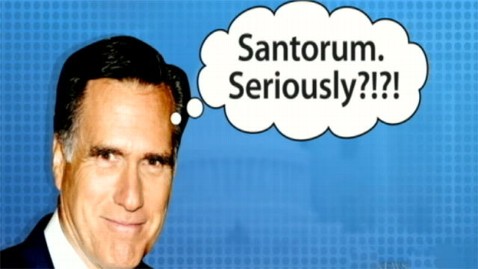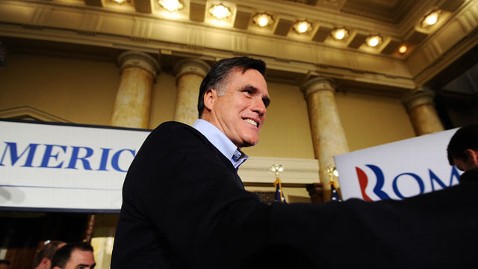'The Bubble Primary' Revisited: GOP Front-Runners Inflate & Burst In Rapid Succession
A Bubble Primary : a race in which candidates' values become artificially high before inevitably deflating back to their intrinsic values.
In November, I wrote a story about how the wild and wacky race for the Republican presidential nomination had become " the bubble primary ," a volatile battle that had seen candidates from Michele Bachmann to Rick Perry , from Herman Cain to Newt Gingrich , suddenly surge to the top of the polls before just as quickly falling back into the pack.
Three months later: The more things change, the more they stay the same. Nearly a fifth of the country has voted since then, but the bubbles of GOP candidates continue to inflate and burst in rapid succession.

(Image Credit: Scott Eells/Bloomberg/Getty Images)
Take the latest polls released this week: Rick Santorum has surged to the top of the pack , taking the lead in this unpredictable race. According to a new CNN/ORC International poll of Republican primary voters nationwide, Santorum now leads Mitt Romney 34 percent to 32 percent. Another poll by the Pew Research Center backed that up, with Santorum enjoying 30 percent support to Romney's 28 percent. A new Gallup poll that showed the race in a statistical dead heat revealed that Santorum had jumped an astounding 14 points in the past week.
This would be the same Rick Santorum who was left for dead after finishing third in Florida and South Carolina, and a dismal fifth in New Hampshire - more than 18,000 votes behind Jon Huntsman, who dropped out of the race the following week.
What gives? In November, I went to Republican strategist Torie Clarke for an explanation. She suggested two reasons for "the bubble primary": one, the flurry of nationally televised debates that helps candidates to move up or down depending on their performances, and two, the intense scrutiny of the national spotlight that shines on the candidate at the top of the polls.

(Image Credit: Phelan M. Ebenhack/AP Photo)
Now that nine states have cast their votes in a primary, I went back to Clarke to find out what she thinks today about this ongoing phenomenon.
"I think it says more about the Republican Party than the individual candidates," she said. "A lot of Republicans are unsure of what they really want this year in a candidate. Some care deeply about social conservative issues, but then they think they care deeply about fiscal matters. Then they care deeply about beating President Obama. They're not sure about what they really want.
"I think a lot of Republicans are just internally conflicted. So when they hear Herman Cain, they go, 'Wow, he can really get a message across and we need that.' Then they get conflicted and they hear Santorum, and they say, 'You know, social issues are the most important thing.' So they respond to that."
Clarke acknowledged that the boom and bust nature of the GOP primary has surprised her - to the point where she could now envision the race going all the way to the convention in Tampa , with no candidate winning enough delegates to lock up a victory ahead of time.
"A couple of months ago I'd have said the voters will settle on a candidate and it'll be the most electable person. Now I'm not sure they will settle," she said. "I don't see any reason for Gingrich or Santorum to drop out at this rate. I could see the possibility of this going all the way to Tampa since time and time again we continue to see the unsettled nature of Republican voters."

(Image Credit: ABC)
After all, Santorum is only the latest candidate to catch fire. Before the former Pennsylvania senator it was Romney's turn. After a commanding victory in last month's New Hampshire primary, Romney saw his stock soar from the 25 percent levels he had attracted for much of the primary to 34 percent in a Jan. 12 Gallup poll - a gain of about 10 percent in two weeks, from the end of December to the middle of January. It appeared that Romney - the candidate everyone expected to win the race all along - was finally poised to sew up the race.
Not so fast. Gingrich - who in that same Gallup poll had plunged 23 points from his highs in early December - came back from the dead to record a resounding win in South Carolina. Of course, no sooner did it look like Gingrich might mount a real challenge to Romney than the former House speaker was crushed in Florida and Nevada.
With far more money and far better organization than all his rivals, why has Romney remained vulnerable to the whims of "the bubble primary" and not taken a stranglehold on the race? What does it say about Romney that after six weeks of voting, Rick Santorum - who in 2006 suffered the worst loss by an incumbent senator in the nation's history - has been able to win the same number of states as the presumptive favorite?
"I think Romney has a more difficult needle to thread in the primary process than Santorum or Gingrich because he's trying to look ahead to the general election and keep the focus on President Obama. Plus he has had a more challenging course than the other guys because he was governor of a state like Massachusetts, and he has had different views on some key conservative issues, so there's a certain distrust from voters," Clarke said.

(Image Credit: Jewel Samad/AFP/Getty Images)
Romney, it warrants mentioning, has been instrumental in making "the bubble primary" what it is - a race in which one candidate takes the lead but then fades when rival campaigns - led by Romney's - launch wave after wave of stinging attacks. Just ask Gingrich what happened in Florida, when Romney and his allies spent more than $15 million on ads - and all but one of those ads was negative.
"This has been like a whack-a-mole tournament," ABC News contributor Matthew Dowd told George Stephanopoulos Thursday on "Good Morning America." "Every time somebody pops up, Mitt Romney is able to whack them back down and then somebody else pops up."
So before Santorum gets too caught up in his current standing atop the polls, he would do well to expect similar treatment to what Gingrich received from Romney in Florida. Nearly two weeks before Michigan's Feb. 28 primary, Romney and his allies so far have outspent Santorum on the state's airwaves by a nearly 50-1 margin: some $2 million from the former to around $42,000 for the latter.
If the past six months of the primary are any indication, Santorum's stay at the top could be short-lived, no matter how much he tries to argue otherwise. As the primary becomes more of a national race with 18 states holding primaries or caucuses over the next month, the lead is likely to change hands again a few more times.
After all, as I noted last November, the nature of bubbles is they always burst …
Matthew Jaffe is covering the 2012 campaign for ABC News and Univision.